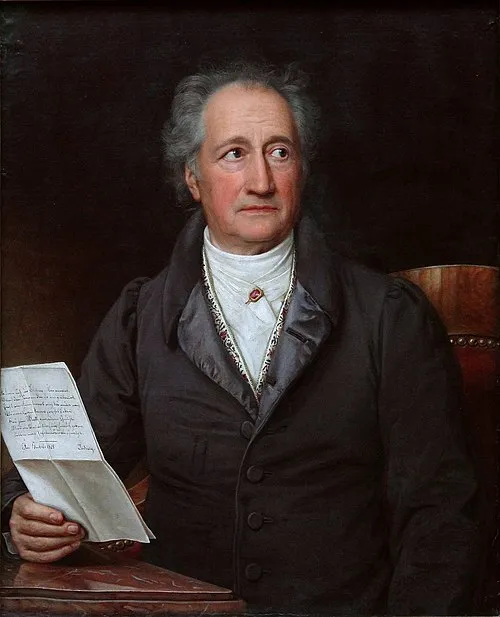
Birth Year: 1749
Full Name: Johann Wolfgang von Goethe
Nationality: German
Professions: Novelist, poet, playwright, and diplomat
Death Year: 1832
1749 – Johann Wolfgang von Goethe, German novelist, poet, playwright, and diplomat (d. 1832)
In the year 1749, a child was born in the small town of Frankfurt am Main, Germany a place that would become the backdrop for his later explorations of life and art. This infant was Johann Wolfgang von Goethe, destined to leave an indelible mark on literature and culture. From his earliest days, it seemed as if he were destined for greatness. The son of a wealthy councilor and a mother who encouraged his artistic inclinations, Goethe was exposed to both privilege and an array of intellectual pursuits that would shape his worldview.
As he grew up, Goethe’s innate talent began to surface. However, despite the comfort provided by his family background, he often found himself grappling with existential questions a theme that would pervade much of his work in later years. By age 16, having already shown remarkable proficiency in poetry and literature, he decided to pursue law at the University of Leipzig. Ironically though, it wasn't long before academic life failed to captivate him; instead of attending lectures on legal theory, he often immersed himself in literary circles scribbling poetry late into the night.
By 1770, having abandoned formal law studies altogether but armed with an insatiable thirst for knowledge and creativity, Goethe published “Götz von Berlichingen,” a play steeped in themes of rebellion against authority perhaps echoing his own struggles against societal norms. This bold move propelled him into prominence within literary circles across Germany. He became involved with prominent figures like Friedrich Schiller arguably one of literature’s most dynamic partnerships as they exchanged ideas and influenced each other’s work profoundly.
The years that followed were marked by creativity but also tumultuous personal relationships; notably his affair with Charlotte Buff left deep impressions on him who knows how many characters owe their complexity to this experience? Despite these emotional upheavals and perhaps because of them Goethe's writing flourished like never before.
In 1774 came "The Sorrows of Young Werther," a novel that captured the hearts of readers across Europe. It told the story of unrequited love through Werther’s passionate letters a poignant reflection not just on love but on individuality itself! His melancholic hero struck a chord during an era when romanticism began emerging as a powerful cultural force across Europe. Yet surprisingly enough and almost ironically the novel sparked such intense emotions among its readers that some reportedly took their own lives after reading it! Could this phenomenon speak volumes about human fragility? Perhaps it was also an indication that Goethe had tapped into something deeper than mere storytelling.
Following this initial success came periods where Goethe ventured beyond literature into philosophy and science a move not entirely unexpected given Enlightenment ideals swirling around him at this time! In fact,... one might argue that few writers have ever woven so many threads together as seamlessly as he did: from botanical studies examining plant growth patterns to poetic reflections inspired by natural landscapes... all intertwined within rich narratives bursting with vivid imagery!
The turn towards scientific inquiry culminated in “Theory of Colours” published in 1810 a text grounded firmly within Romantic principles yet proposing ideas radically different from Newtonian physics! Herein lies another irony; although regarded today more as poet than scientist... critics during those times might have viewed him primarily through lens colored by skepticism due solely based upon genres traditionally considered ‘serious’ pursuits!
No discussion about Goethe would be complete without mentioning "Faust," arguably one piece where ambition meets tragedy most poignantly: spanning two parts written over decades . Centering around Faust's pact with Mephistopheles offering one's soul for ultimate knowledge it tackles themes concerning desire versus fulfillment which resonate throughout history even today! In many ways,... Faust mirrors our modern obsessions: fame-driven choices sacrificing integrity… How eerily familiar does such conflict feel amid contemporary society?
However… after producing monumental works both theatrical & poetic until late into life , it's fascinating how little recognition granted those struggling along similar paths today seems particularly ironic considering present-day discourse surrounding mental health issues stemming from artistic expressions mirrors sentiments articulated centuries prior!
A diplomat too… following Napoleon's rise across Europe influenced large swathes European politics including statesmen decisions affecting daily lives alike citizens sought meaning amidst chaos descending upon once stable grounds thereof even mirroring aspects reflective ongoing geopolitical landscapes shaping global dialogues presently! Engaging minds outside realm artistry informed perspectives interconnectedness fostering understanding often lost amid ideological battles fiercely waged elsewhere!!!
A defining aspect surrounding legacy is perhaps best captured via historical vignettes revealing how deeply ingrained messages continue resonating amidst shifting cultures evolving alongside technology advancements crafting new dialogues whilst revisiting old ones we see glimpses parallels reflecting contemporary struggles regarding identity exploration experiences shared universally hinting continuity despite various transformations encountered through ages passed!!

